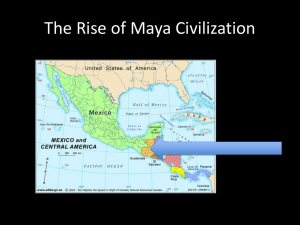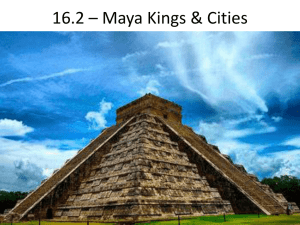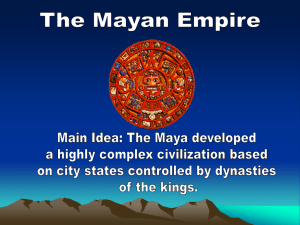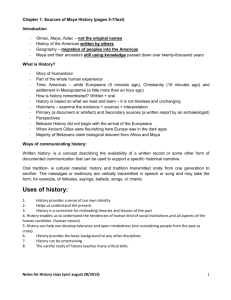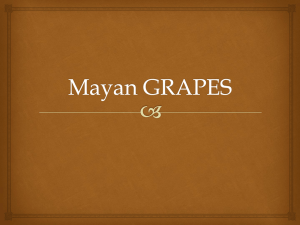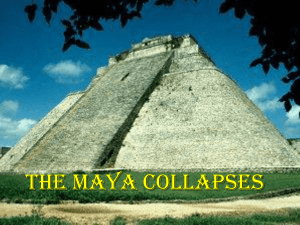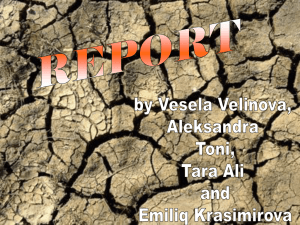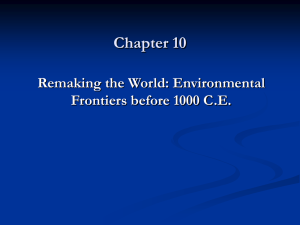Maya Mystery PPt
advertisement
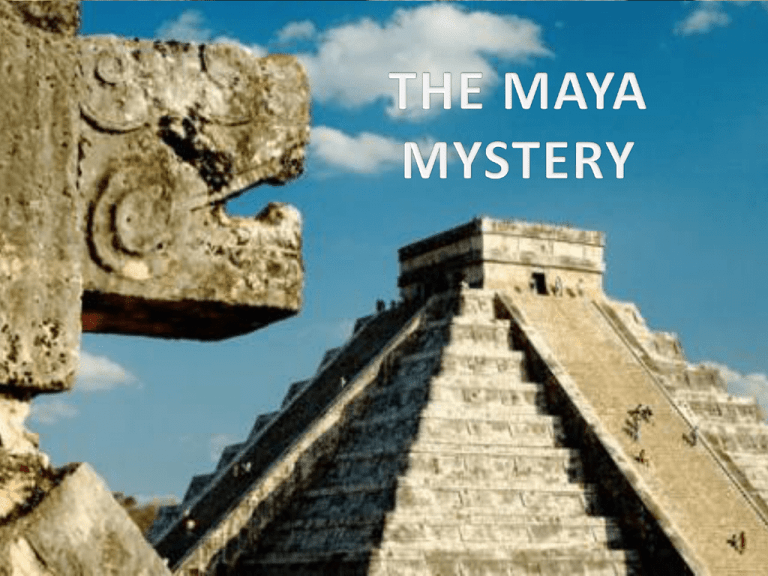
Drought/ Climate Change Overpopulation/ Poor Agricultural Practices/ Famine Destruction of Eco System Maya Mystery War/ Natural Social Upheaval Disaster Disease Research in 2001 by University of Florida peleoclimatologists, consisting of analysis from the bottom of Lake Punta Laguna has shown that the region's generally wet conditions were interspersed with periods of dryness. These occurred around 250, 585, and 800 — the latter event was especially long, into the eleventh century. These dates correspond to period where little Maya development is observed in the surviving arts and architecture. The scientists discovered that the ninth century had been the driest time in the region for 7,000 years. They took cores of mud from the bottom of the lake. The mud had built up over thousands of years the deeper the mud, the older the shells and seeds it contained. A core from the ninth century showed an exceptional surge of heavy oxygen, indicating it was the driest time in the region for 7,000 years. The Maya required massive amounts of wood to fuel the fires that cooked the lime plaster they used to build their elaborate constructions—experts estimate it would have taken 20 trees to produce a single square meter of cityscape. Because cleared land absorbs less solar radiation, less water evaporates from its surface, and less evaporation makes clouds and rainfall more scarce. As a result, the rapid deforestation made an already severe drought worse. Deforestation reduced precipitation by 5 to 15 % and was responsible for 60 % of the total drying that occurred over the course of a century as the Mayan civilization collapsed. Tropical soils quickly become drained of their nutrients when exposed to the sun. "We're not saying deforestation explains the entire drought, but it does explain a substantial portion of the overall drying that is thought to have occurred," said Benjamin Cook. Newly deciphered stone carvings clearly indicate that the Maya warred frequently and viciously among themselves. City-states such as Dos Pilas, Tikal, Copán and Quirigua went to war with one another quite often. A series of natural disasters could have instigated an increase in warfare. Rulers felt their powers were failing and the gods required more and more royal blood - their own personal bloodletting was insufficient – they decided to attack other Maya cities to secure other royalty to sacrifice to the insatiable gods. What happened when these royals were captured is that they were not immediately sacrificed but were kept for years to be bled at ritual ceremonies. Meanwhile there was no one running the show back at their homes. Their heirs could not take over leadership responsibilities because the ruler was still alive. The belief system was shattered. Finally it got to the point that people just deserted the cities, and rewrote the rules - adapting their belief system as best they could. Hieroglyphs in the area reveal that Tikal and Calakmul, were bitter rivals for centuries. Skirmishes between the kings of each city grew increasingly violent, prompting both to build alliances with other cities via raids, conquest, and royal coups. But, as more and more cities got involved, the warfare spread. In 2002 archaeologists discovered a stunning new set of hieroglyphic texts carved into the steps of a palace staircase at Dos Pilas .The texts told the surprising story of renegade princes from Tikal, who tried to create an empire of their own by waging a full-force attack on their home city with the help of neighboring allies. The invasion occurred during the height of the drought, and the result was pure devastation. Pyramids and temples were torn apart to build fortifications, and what few trees were left in the razed rainforest were cut down to build fences. Eventually, farmers had to retreat to the fast-growing weeds. The war destroyed the cities, leaving behind ruins and refugees. Maya War Theory Maya War Theory Clues to the Maya collapse can be found at Copán, a Maya site in western Honduras. A conclusion that is based on botanical and bone evidence indicate malnutrition and disease was a part of the Mayan history. Over 80% of the skulls of people showed signs of anemia. Anemia in all classes suggests severe malnutrition, possibly causing a rapid collapse in society. Spongy marks on skulls found at Copal are due to lack of iron in the diet. Recently scientists discovered a distinct beige clay mineral in ruined canals at Guatemala's Tikal archaeological site—once the largest city of the southern Maya lowlands. The mineral, a type of smectite, derives only from the breakdown of volcanic ash. Using chemical fingerprinting techniques, the team showed that the smectite at Tikal came from volcanoes within Guatemala and in what are now El Salvador, Honduras and Mexico. The tiny ash particles would have suffocated many plantpollinating insects and ash can encourage acid rain, which can harm crops. Maya had completely transformed the land on which they lived by turning jungles into a vast area of plains filled with cities, farms, and an ever-growing population. In fact, settlements around centers like Tikal reached more than half the population density of modern-day New York City. The large population in the cities must have put great strain on the food production. A famine or other agricultural calamity affecting these basic crops could certainly have caused the downfall of the ancient Maya. A large population was probably insupportable because of the difficulties of ensuring a steady water supply and because of the limits of the region's agricultural capacity. As the Mayan population grew, however, the society became vulnerable to the limitations of their environment. They gobbled up the resources around them, but failed to develop new ideas to fix the problem. http://www.buriedmirror.com/history/great-collapse.htm http://hmcurrentevents.com/the-maya-environment/ http://www.world-mysteries.com/Fall_of_of%20Mayan_civilization.htm http://www.huffingtonpost.com/2012/08/22/maya-collapse-drought-climatechange_n_1821526.html http://www.articlesnatch.com/Article/The-Mayan-Civilization--The-Collapse/377149 http://www.usatoday.com/tech/science/columnist/vergano/2008-06-22-maya-kiuic_N.htm http://www.jaguar-sun.com/ http://www.buriedmirror.com/history/great-collapse.htm http://www.learner.org/interactives/collapse/ http://www.buriedmirror.com/history/great-collapse.htm http://latinamericanhistory.about.com/od/Maya/p/What-Happened-To-The-Ancient-Maya.htm

